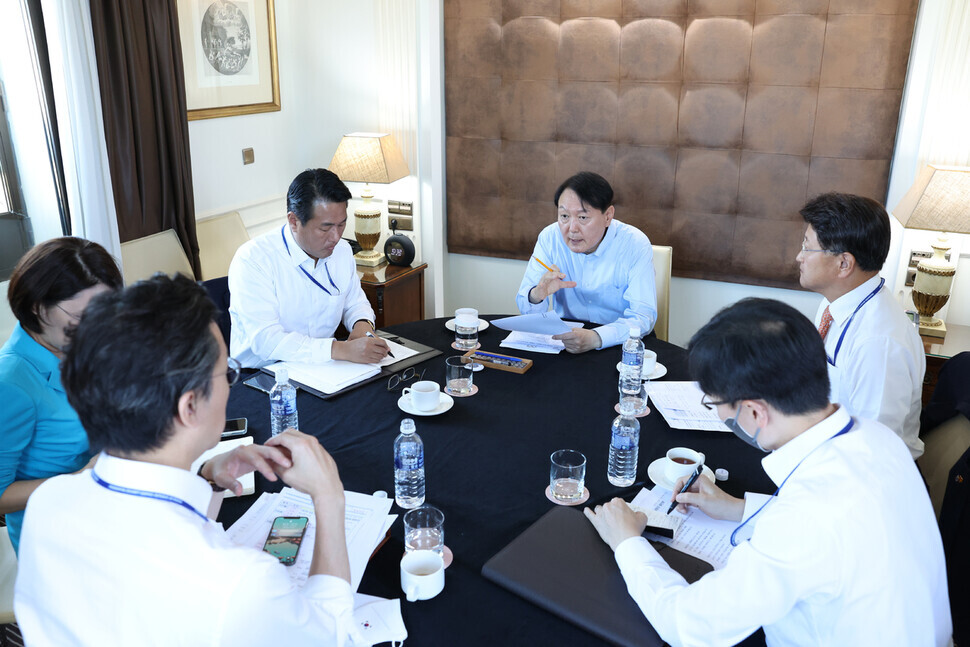hankyoreh
Links to other country sites 다른 나라 사이트 링크
S. Korea-US-Japan trilateral summit to touch on response to N. Korea, checking China

Interest is mounting about whether the leaders of South Korea, the US and Japan will offer a concrete plan on the North Korean nuclear issue when they meet on Tuesday night on the sidelines of the NATO summit in Madrid, Spain.
Some likely items on the agenda of the trilateral summit — the first to be held since September 2017 — are the normalization of South Korea and Japan’s GSOMIA intelligence-sharing agreement, the security threat presented by North Korea’s growing nuclear capabilities, and regional affairs in Northeast Asia, including the containment of China.
South Korean President Yoon Suk-yeol will be meeting US President Joe Biden for the second time in barely 40 days after the two leaders’ summit in May. This will be his first meeting with Japanese Prime Minister Fumio Kishida.
The leaders of the three countries are expected to reconfirm “trilateral cooperation” on responding to North Korea’s nuclear weapon and missile programs and to call on Pyongyang to return to dialogue. The three countries confirmed their cooperative stance in a joint statement on North Korea released following a previous conference between their top diplomats on May 28.
One key question is how the three countries mean to respond to North Korea’s seventh nuclear weapon test, which is believed to be imminent.
When the three leaders met during the G20 summit in Hamburg, Germany, in July 2017, they took the unusual step of releasing a statement that read, “The leaders affirmed the importance of working together to counter the [North Korean] threat and to achieve the complete, verifiable, and irreversible denuclearization of the Korean Peninsula in a peaceful manner, a shared goal among the three countries.”
In September of that same year, the leaders met again over lunch during the UN General Assembly in New York and called on the international community to impose sanctions and pressure greater than Pyongyang could endure, forcing it to come to the table for dialogue. At the time, the Korean Peninsula was in a state of extreme tension because of the North’s sixth nuclear test in September 2017.
But since this trilateral summit is only supposed to last 25 minutes, some analysts think the three leaders’ statement will only underline trilateral cooperation rather than outlining concrete countermeasures.
Another matter of interest is what attitude the three leaders will adopt toward China. The US and Japan are actively seeking to rein in China. As China’s rivalry with the US grows sharper by the day, China has expressed its displeasure with the fact that South Korea and Japan, both non-NATO states, plan to attend the summit, while mentioning a “new Cold War.”
South Korea’s presidential office said it will keep its distance from the US and Japan’s containment of China.
“We aren’t here in Madrid to talk about China and the Taiwan Strait, but to consider how Korea should act in the world as a global state in keeping with the Korean brand and to cooperate with other countries in regard to that,” said an official from the presidential office.
Even so, the US — as the driving force behind NATO — is likely to ask or even pressure Korea to join its containment of China, since that is related to its very decision to invite non-NATO states in Asia such as South Korea, Japan, Australia and New Zealand to the summit.
“Considering that European dilemmas and disagreements about China’s expanding economic and security influence are also found in the Indo-Pacific region, I think you could say there’s a strategic rapport about how we should cooperate with NATO,” said the official from the presidential office.
By Kim Mi-na, staff reporter
Please direct questions or comments to [english@hani.co.kr]

Editorial・opinion
![[Column] Season 2 of special prosecutor probe may be coming to Korea soon [Column] Season 2 of special prosecutor probe may be coming to Korea soon](https://flexible.img.hani.co.kr/flexible/normal/500/300/imgdb/original/2024/0426/3317141030699447.jpg) [Column] Season 2 of special prosecutor probe may be coming to Korea soon
[Column] Season 2 of special prosecutor probe may be coming to Korea soon![[Column] Park Geun-hye déjà vu in Yoon Suk-yeol [Column] Park Geun-hye déjà vu in Yoon Suk-yeol](https://flexible.img.hani.co.kr/flexible/normal/500/300/imgdb/original/2024/0424/651713945113788.jpg) [Column] Park Geun-hye déjà vu in Yoon Suk-yeol
[Column] Park Geun-hye déjà vu in Yoon Suk-yeol- [Editorial] New weight of N. Korea’s nuclear threats makes dialogue all the more urgent
- [Guest essay] The real reason Korea’s new right wants to dub Rhee a founding father
- [Column] ‘Choson’: Is it time we start referring to N. Korea in its own terms?
- [Editorial] Japan’s rewriting of history with Korea has gone too far
- [Column] The president’s questionable capacity for dialogue
- [Column] Are chaebol firms just pizza pies for families to divvy up as they please?
- [Column] Has Korea, too, crossed the Rubicon on China?
- [Correspondent’s column] In Japan’s alliance with US, echoes of its past alliances with UK
Most viewed articles
- 1‘We must say no’: Seoul defense chief on Korean, USFK involvement in hypothetical Taiwan crisis
- 2[Editorial] Korea’s surprise Q1 growth requires objective assessment, not blind fanfare
- 3[Column] Season 2 of special prosecutor probe may be coming to Korea soon
- 4Division commander ordered troops to enter raging flood waters before Marine died, survivor says
- 5Is Japan about to snatch control of Line messenger from Korea’s Naver?
- 6The dream K-drama boyfriend stealing hearts and screens in Japan
- 7[Column] ‘Choson’: Is it time we start referring to N. Korea in its own terms?
- 8No good, very bad game for Korea puts it out of Olympics for first time since 1988
- 9[Special report- Part III] Curses, verbal abuse, and impossible quotas
- 10S. Korea “monitoring developments” after report of secret Chinese police station in Seoul